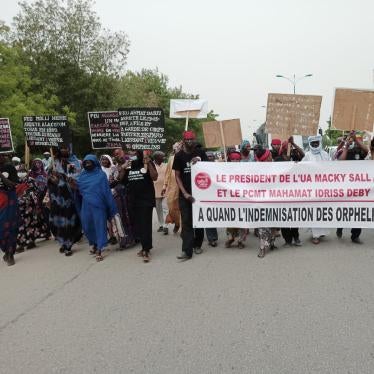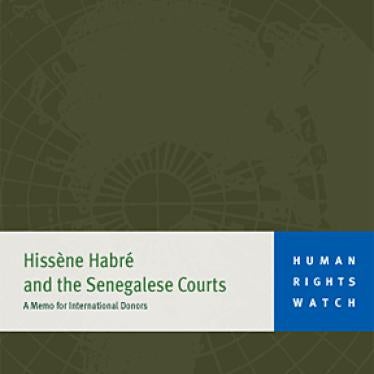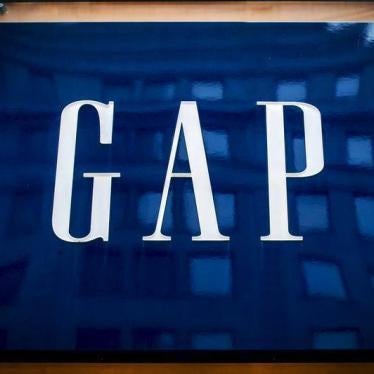(Dakar)- The arrival of a European Union delegation in Dakar on Monday to assist Senegal in preparing the trial of Hissène Habré will boost efforts to bring the former Chadian dictator to justice, a group of African and international human rights organizations said today.
Habré, who ruled Chad from 1982 to 1990, when he fled to Senegal, is accused of thousands of political killings, systematic torture and waves of "ethnic cleansing" during his rule. In July 2006, Senegal agreed to an African Union request to prosecute Habré "on behalf of Africa."
The EU delegation, headed by Bruno Cathala, the Registrar of the International Criminal Court (ICC), arrives in Dakar on January 21 in response to a request by Senegalese President Abdoulaye Wade for international assistance in preparing the trial. The EU experts will evaluate Senegal's needs and propose technical and financial help.
The rights groups endorsed the call for international support.
"The challenges are considerable, and the expense is significant, but if Habré gets a fair trial, this case will be a landmark in the fight against impunity," said Jacqueline Moudeina, president of the Chadian Association for the Promotion and Defense of Human Rights and a lawyer for the victims. "Countries that support justice for victims of torture and other atrocities should help Senegal meet the challenge."
Senegal has said that the investigation and trial will cost 28 million euros, and last week said that it would spend over 1.5 million euros (1 billion francs CFA) on the trial. In addition to the EU, a number of individual countries including France and Switzerland have publicly committed to helping Senegal.
"Senegal's commitment to prosecute Habré marks the first time that an African country will investigate and try massive crimes committed by a foreign leader," said Reed Brody, a lawyer at Human Rights Watch who has been working to bring Habré to justice since 1999.
The groups insisted that Senegal need not wait for international assistance in order to move forward with the case. They called on Senegal to take legal steps to ensure Habré's presence at the trial, as required by the United Nations Convention Against Torture.
"It's been 18 months since Senegal agreed to try Habré. Nothing prevents Senegal from opening an investigation right now," said Alioune Tine of the Dakar-based African Assembly for the Defense of Human Rights (RADDHO). "Senegal will have a lot of explaining to do if Hissène Habré flies the coop."
In November 2007, Senegalese justice officials promised lawyers for Habré's victims that an investigating magistrate would be named to carry out the probe of Habré "within months."
The African Union has named Robert Dossou, Benin's former foreign minister and justice minister, as an envoy to the trial.
The rights groups noted that the Strategic Partnership agreement signed at December's EU-Africa summit in Lisbon says that "crimes against humanity, war crimes and genocide should not go unpunished and their prosecution should be ensured."
In April 2007, the European Parliament invited the European Union "to encourage and assist the government of Senegal in preparing for the prompt and fair trial of Hissène Habré, in order to answer accusations of mass violations of human rights."
In February 2007, Senegalese President Abdoulaye Wade signed into law measures permitting Senegal to prosecute cases of genocide, crimes against humanity, war crimes and torture, even when they are committed outside Senegal, thus removing the primary legal obstacles to Habré's trial.
Background
Hissène Habré ruled Chad from 1982 until he was deposed in 1990 by President Idriss Déby Itno and fled to Senegal. His one-party regime was marked by widespread atrocities, including waves of ethnic campaigns. Files of Habré's political police, the DDS (Direction de la documentation et de la sécurité), which were discovered by Human Rights Watch in 2001, reveal the names of 1,208 persons who died in detention. A total of 12,321 victims of human rights violations were mentioned in the files.
Habré was first indicted in Senegal in 2000 before courts ruled that he could not be tried there. His victims then turned to Belgium and, after a four-year investigation, a Belgian judge in September 2005 charged Habré with crimes against humanity, war crimes and torture. Pursuant to the Belgian extradition request, Senegalese authorities arrested Habré in November 2005. The Senegalese government then asked the African Union to recommend how to try Habré. On July 2, the African Union, following the recommendation of a Committee of Eminent African Jurists, called on Senegal to prosecute Habré "in the name of Africa," and Senegalese President Wade declared that Dakar would do so.







